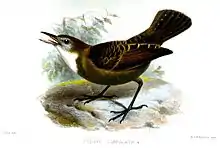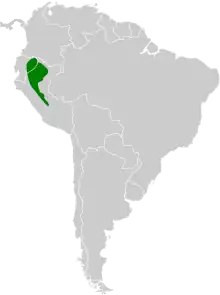Lunulated antbird
The lunulated antbird (Oneillornis lunulatus) is a species of insectivorous bird in the family Thamnophilidae. It is found in Ecuador and Peru. Its natural habitat is subtropical or tropical moist lowland forests.
| Lunulated antbird | |
|---|---|
 | |
| Illustration of a female | |
| Scientific classification | |
| Domain: | Eukaryota |
| Kingdom: | Animalia |
| Phylum: | Chordata |
| Clade: | Dinosauria |
| Class: | Aves |
| Order: | Passeriformes |
| Family: | Thamnophilidae |
| Genus: | Oneillornis |
| Species: | O. lunulatus |
| Binomial name | |
| Oneillornis lunulatus (Sclater, PL & Salvin, 1873) | |
 | |
| Synonyms | |
|
Gymnopithys lunulatus | |
This species is a specialist ant-followers that relies on swarms of army ants to flush insects and other arthropods out of the leaf litter.[2]
The lunulated antbird was described and illustrated by the English ornithologists Philip Sclater and Osbert Salvin in 1873 and given the binomial name Pithys lunulatus.[3] The species was subsequently included in the genus Gymnopithys. It was moved to a newly erected genus Oneillornis based on the results of a molecular phylogenetic study published in 2014.[4] The species is monotypic.[5]
References
- BirdLife International (2016). "Oneillornis lunulatus". IUCN Red List of Threatened Species. 2016: e.T22701879A93852818. doi:10.2305/IUCN.UK.2016-3.RLTS.T22701879A93852818.en. Retrieved 12 November 2021.
- Willis, Edwin O. (1968). "Studies of the behavior of Lunulated and Salvin's antbirds" (PDF). Condor. 70 (2): 128–148. doi:10.2307/1365956. JSTOR 1365956.
- Sclater, Philip L.; Salvin, Osbert (1873). "On the birds of Eastern Peru". Proceedings of the Zoological Society of London (2): 252–311 [276] Plate 26.
- Isler, M.L.; Bravo, G.A.; Brumfield, R.T. (2014). "Systematics of the obligate ant-following clade of antbirds (Aves:Passeriformes: Thamnophilidae)". Wilson Journal of Ornithology. 126 (4): 635–648. doi:10.1676/13-199.1. S2CID 83806772.
- Gill, Frank; Donsker, David, eds. (2018). "Antbirds". World Bird List Version 8.1. International Ornithologists' Union. Retrieved 23 February 2018.
